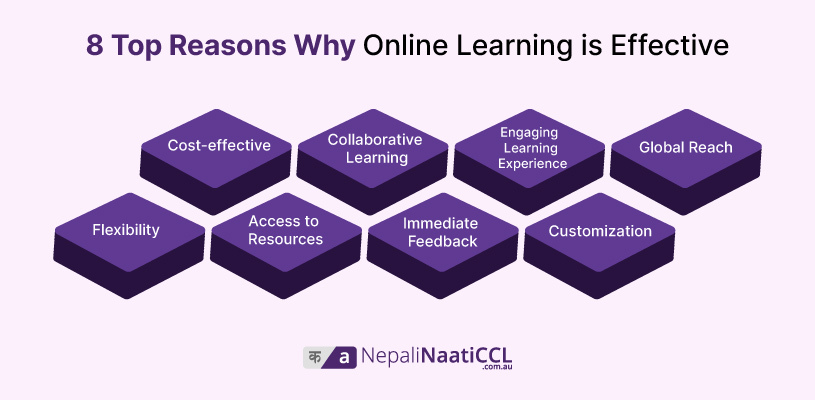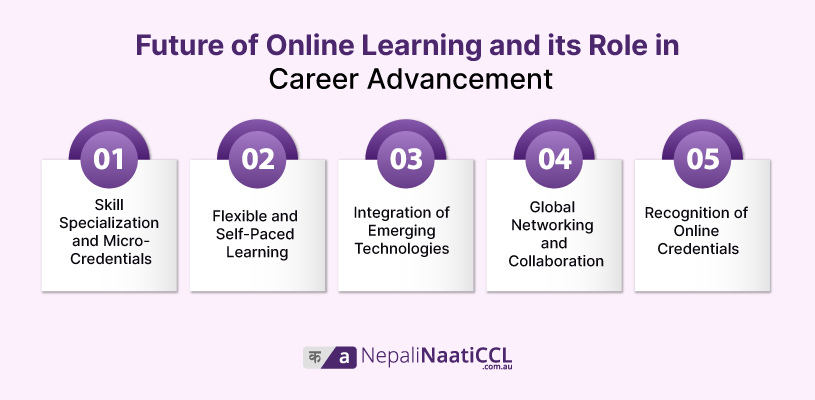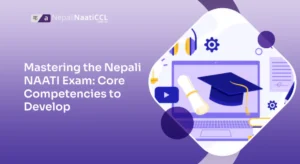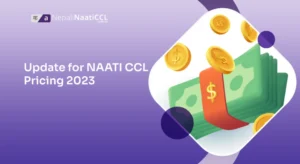Are you looking for a way to pass the NAATI CCL certification for 5 Australian PR points? Have you considered online learning as a means to prepare for the NAATI CCL test? In this blog, let’s learn eight reasons why online learning is effective.
Online learning has become increasingly popular, especially after the COVID-19 pandemic. Also, with its flexibility and convenience, online learning has proven to be an effective way to gain knowledge and skills from your home.
Further into the blog, I will also provide tips and insights to help you maximize your online learning experience and succeed in the NAATI CCL test. So, whether you’re a beginner or an advanced learner, read on to discover the benefits of online learning for achieving NAATI CCL certification.
Let’s get started.
Technology-Driven Learning
Online learning utilizes the latest technology to enhance the learning experience for students preparing for the NAATI CCL test. Also, with the rapid technological advancements, online learning platforms now provide a wide range of multimedia tools, interactive exercises, and assessments designed to help students better understand complex topics and concepts.
The interactive nature of technology-driven learning engages learners actively, makes learning more enjoyable, and reinforces understanding through different methods.
Furthermore, the flexibility of technology-driven learning stands out. Learners can adapt their study schedules to their convenience.
Likewise, the instant feedback mechanisms in technology-driven learning are noteworthy. Traditional assessments often involve long waiting periods for results.
However, online platforms provide immediate feedback on quizzes and assignments, allowing learners to address weaknesses promptly.
Furthermore, one of the primary benefits of why online learning is effective is that it allows for personalized learning experiences. Online learning platforms use algorithms and machine learning to tailor course materials to individual students’ needs.
This means that students can learn at their own pace and focus on areas where they need more support, resulting in a more efficient and effective learning experience.
8 Top Reasons Why Online Learning is Effective

Online learning has emerged as an effective way for students to prepare for the NAATI CCL test and achieve their desired language proficiency level. Also, online learning and coaching classes can be effective for those seeking certification.
The following are eight reasons why online learning is effective.
1. Flexibility
Flexibility offers learners a unique approach to acquiring knowledge. To begin with, online learning allows individuals to access educational content at their own pace and convenience.
This means that learners have the flexibility to choose when and where they engage with course materials, aligning their study schedules with personal and professional commitments.
Similarly, the adaptability of online learning is especially beneficial for those with diverse schedules. Whether someone is a working professional or managing family responsibilities, the flexible nature of online courses provides an opportunity to balance learning with other aspects of life.
This adaptability fosters a sense of control over one’s education, allowing learners to navigate their academic journey in a way that suits their needs. Hence, with the freedom to choose when and where to study, learners can create an environment that best suits their optimal learning conditions.
2. Cost-effective
The cost-effectiveness of online learning is a significant factor that makes it a practical and accessible choice for many individuals.
First and foremost, learners can engage in courses from home, reducing transportation costs and traveling time. This not only eases the financial burden on individuals but also makes education more feasible for those facing challenges associated with daily commutes.
Moreover, online learning contributes to cost savings by addressing accommodation expenses. Unlike traditional education, which may require individuals to relocate for studies, online learning allows learners to access educational content from their existing location.
Another aspect of cost-effectiveness in online learning is related to course materials. Traditional textbooks and materials can be expensive, but online resources often offer a more economical alternative.
Many online educational materials are digital and easily accessible at no cost or at a fraction of the price of traditional printed materials.
3. Access to Resources
If you choose to learn virtually, you will have an extensive array of educational materials, creating a virtual library that learners can tap into at any time. This includes text-based resources and multimedia presentations to cater to various learning preferences.
However, one notable advantage is the accessibility of resources regardless of geographical location. Unlike traditional education, online learning breaks down these barriers.
Learners, regardless of their location, can access a global pool of resources. Online platforms offer interactive simulations, videos, and collaborative tools, providing learners with options to engage with the material in ways that resonate with their individual preferences.
Moreover, visual learners may prefer videos and infographics, while auditory learners may find podcasts or recorded lectures more effective. The flexibility to choose the most suitable format enhances the overall understanding of the subject matter.
4. Collaborative Learning
Collaborative learning involves students working together on tasks, projects, or discussions, creating synergy beyond individual efforts.
Various online tools, such as discussion forums, virtual classrooms, and collaborative project platforms, facilitate this approach. Also, collaborative learning is one of the most crucial daily habits for NAATI CCL success.
Students can share diverse perspectives and insights through discussion forums and group activities. This dynamic interaction promotes critical thinking as individuals engage in constructive debates, challenging and refining their understanding.
Moreover, with collaborative learning, students feel a connection to their peers, creating a virtual community that transcends geographical boundaries. This community-building aspect is crucial in online education, where learners may be physically distant but can still form meaningful connections through collaborative activities.
5. Immediate Feedback
Immediate feedback allows learners to receive information on their assessments, quizzes, or assignments promptly after completion. This quick turnaround contrasts traditional educational settings, where waiting for feedback can be long.
Moreover, immediate feedback enables learners to swiftly identify and address areas that require improvement. With timely insights into their strengths and weaknesses, students can adapt their learning strategies in real time.
Hence, this proactive approach contributes to a more dynamic and effective learning experience, as learners can refine their understanding before moving on to new concepts.
Furthermore, the instant feedback mechanisms in online learning promote a continuous learning loop. Learners can engage in an iterative learning and assessment process, allowing them to understand their progress and make necessary adjustments.
Knowing that feedback is immediate encourages learners to stay engaged and attentive to their performance. However, I also recommend checking out the assessment criteria of the NAATI CCL test.
6. Engaging Learning Experience
Creating an engaging learning experience is a fundamental goal of online education. Firstly, online platforms employ multimedia elements such as videos, interactive simulations, and graphics to stimulate learning visually.
These dynamic resources convey information effectively and cater to different learning styles, making the educational content more accessible and engaging.
Additionally, the interactive nature of online learning fosters engagement by providing opportunities for active participation. The flexibility of online learning contributes to an engaging experience where learners can choose when and where to study.
This adaptability encourages individuals to take control of their learning journey. As we explore these aspects in more detail, the importance of an engaging and dynamic educational environment becomes increasingly apparent in the context of online learning.
7. Customization
Customization is a pivotal feature of online learning, allowing learners to tailor their educational experience to suit their preferences. This means individuals can customize their learning journey according to their unique aspirations.
Moreover, the flexibility in the structure of online courses facilitates customization. Learners can often choose between different learning modes, such as self-paced courses, live webinars, or interactive discussions.
Additionally, online learning allows learners to focus on specific areas of interest within a broader subject. Instead of following a fixed curriculum, individuals can customize their learning path by selecting modules or topics that are particularly relevant or intriguing.
The availability of diverse learning resources supports customization. Hence, learners can choose the resources that resonate with their preferred learning style.
8. Global Reach
The concept of global reach in online learning is transformative, breaking down geographical barriers and connecting learners from around the world. Firstly, online education transcends physical locations, allowing individuals to access courses and educational resources from around the globe.
Moreover, the global reach of online education contributes to a rich exchange of cultural perspectives and ideas. Learners from different countries and backgrounds can share their insights in virtual classrooms and discussion forums, creating a dynamic learning environment.
Learners who may not have access to traditional educational institutions can participate in online courses, gaining valuable knowledge and skills.
Furthermore, online learning facilitates international collaboration on projects and research. Students and professionals worldwide can collaborate towards common goals.
Interactive Learning Tools: Engaging Students for Better Learning Outcomes
Interactive learning tools are another essential feature of technology-driven learning. Online learning platforms provide a wide range of multimedia tools, such as interactive exercises, quizzes, and games, that help students engage with the material in a fun and interactive way.
Moreover, interactive learning tools foster engagement by providing students with dynamic and participatory learning experiences. Unlike traditional methods, interactive tools captivate students’ attention and make learning more enjoyable.
Moreover, the adaptability of interactive learning tools ensures good marks in the NAATI CCL test and a better chance to boost your career and life in Australia.
Features like online discussions, group projects, and virtual classrooms create an interactive and communal learning environment. This encourages the exchange of ideas and cultivates teamwork and communication, which are integral for success in both academic and professional realms.
Hence, by fostering active participation, adapting to diverse learning styles, providing real-time feedback, and encouraging collaboration, these tools contribute to a richer and more effective educational experience.
Also, Interactive learning tools can help students stay motivated and achieve better learning outcomes by making learning more engaging and enjoyable.
Future of Online Learning and its Role in Career Advancement

As technology evolves, online learning is becoming an increasingly popular and effective way to acquire new skills and knowledge and advance one’s career. Online learning provides learners with the flexibility and convenience to study at their own pace, on their own schedule, and from anywhere in the world.
Likewise, the following five points discuss why online learning is effective, its future, and its role in career advancement.
1. Skill Specialization and Micro-Credentials
Skill specialization and micro-credentials are pivotal aspects of the evolving landscape of online learning, offering learners targeted and efficient avenues for career development.
Similarly, the rise of micro-credentials has emerged as a valuable trend in online learning. Micro-credentials are focused certifications that validate a learner’s proficiency in a particular skill or subject.
These bite-sized credentials provide a more flexible and accessible way for individuals to showcase their expertise, allowing them to stack these credentials over time and create a personalized learning pathway.
Also, the flexibility in skill specialization and micro-credentials is noteworthy. Learners can choose courses that align with their career aspirations and personalize their learning journey.
Focusing on specific skills at one’s own pace enhances the overall learning experience.
2. Flexible and Self-Paced Learning
Flexible and self-paced learning allows individuals to access educational content at their convenience. Learners can choose when and where to engage with course materials, making it easier to balance their studies with work, family commitments, and other responsibilities.
This flexibility accommodates the diverse schedules of learners, fostering a more inclusive and accessible approach to education.
Also, unlike traditional classrooms with fixed timelines, online courses often allow learners to set their own pace, ensuring a more personalized and stress-free learning experience. Self-paced learning and flexibility are crucial steps to make your NAATI CCL test successful.
Professionals can pursue further education without disrupting their work schedules by seamlessly integrating learning into their professional lives. This makes education a continuous and manageable aspect of professional development.
Moreover, this inclusivity promotes equal opportunities for success, irrespective of individual learning styles or the pace at which knowledge is acquired.
3. Integration of Emerging Technologies
The integration of emerging technologies is reshaping the landscape of online learning. The incorporation of artificial intelligence (AI) is enhancing personalized learning experiences.
AI algorithms can analyze learner data to understand individual strengths and weaknesses and, in turn, provide recommendations and adaptive content.
Additionally, the integration of virtual reality (VR) is introducing a new dimension to online education. VR simulations create lifelike scenarios, allowing learners to engage in practical, hands-on experiences in a virtual environment.
Also, the rise of augmented reality (AR) contributes to real-time, interactive learning experiences. AR overlays digital information onto the physical world, providing learners additional insights and context.
4. Global Networking and Collaboration
Global networking and collaboration are integral to the online learning experience, fostering a sense of interconnectedness among learners worldwide. It is common knowledge that online platforms allow learners to connect with peers, instructors, and professionals from diverse locations.
Discussion forums, virtual classrooms, and collaborative projects create a virtual space where individuals can share ideas, perspectives, and experiences.
Moreover, engaging with peers from different parts of the world brings a diversity of thought and experiences. This global collaboration is particularly valuable in preparing individuals for a workforce where intercultural competence is increasingly important.
Additionally, this technology-driven collaboration ensures that individuals can work seamlessly across time zones and geographical distances, overcoming any logistical challenges.
5. Recognition of Online Credentials
The recognition of online credentials is developing a significant shift in how employers perceive the value of online learning.
As online education becomes more widespread and reputable institutions offer courses, certifications, and even degrees, employers increasingly acknowledge these credentials’ credibility.
Moreover, many online courses’ practical and skills-oriented nature aligns well with the demands of the modern job market. Employers now recognize that individuals with online credentials often possess practical skills directly applicable to their roles.
Also, professionals who continually update their skills through online courses are seen as proactive and adaptable contributors to the workplace.
Furthermore, the transparency and accessibility of online credentials make them more accessible for employers to verify. Many online platforms provide digital badges, certificates, or transcripts that can be easily shared and verified electronically.
NepaliNAATICCL – Your Online Portal for NAATI CCL Course Materials
NepaliNAATICCL is an online learning portal that provides Nepali-speaking students access to a wide range of NAATI CCL course materials, resources, and free NAATI CCL test samples. The portal offers a comprehensive and structured learning program that covers all aspects of the NAATI CCL exam.
Having learned why online learning is effective, one of the critical advantages of NepaliNAATICCL is its flexible and self-paced learning approach, which allows students to study at their own pace and on their schedule with proper guidance at every step.
In addition, NepaliNAATICCL provides students with access to a team of experienced and qualified instructors who are available to provide feedback, guidance, and support throughout the learning process.
Our goal is to assist you in successfully navigating the NAATI CCL test, opening doors to career opportunities in linguistic fields, and earning five valuable Australian PR points for a smoother migration process.
Contact us now and get a free demo coaching class.
Conclusion
As we have discussed, there are several reasons why online learning is effective for achieving and overcoming the difficulties of NAATI CCL certification.
We are at the end of our blog, and you must, by now, realize online learning is the future of education and is poised to play an essential role in career advancement and professional development.
As technology continues to evolve, we expect to see further advancements in online learning that will only make the learning experience more engaging and effective.
Moreover, the NepaliNAATICCL online portal is an excellent resource for Nepali-speaking individuals who want to achieve NAATI CCL certification. It provides a range of study materials and courses, making it easier for learners to prepare for the NAATI CCL exam and pass it on the first attempt.
FAQ
Q.1: Is online learning as effective as traditional classroom learning?
Yes, online learning can be just as effective as traditional classroom learning and, in some cases, even more effective. Numerous studies have shown that students in online learning environments can achieve the same or better academic results than their peers in traditional classrooms.
Q.2: Can online learning provide personalized instruction?
Yes, online learning can provide personalized instruction through adaptive learning technologies that tailor the learning experience to the individual student. These technologies can analyze a student’s strengths and weaknesses and adjust the pace and content of instruction accordingly.
Q.3: Can online learning be more affordable than traditional classroom learning?
Yes, online learning can be more affordable than traditional classroom learning, especially considering the cost savings associated with not having to commute to a physical classroom or pay for room and board. Additionally, many online courses and resources are available for free or cheap.
Q.4: Can online learning be accessed from anywhere in the world?
Yes, online learning can be accessed from anywhere worldwide, as long as you have an internet connection. This makes online learning an excellent option for individuals needing access to traditional educational institutions or having busy schedules that make attending in-person classes difficult.




